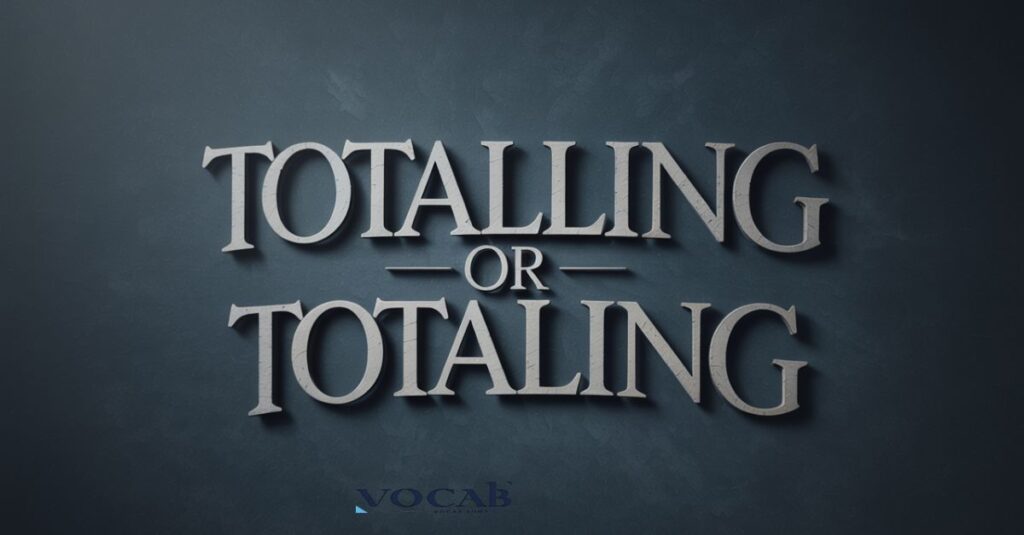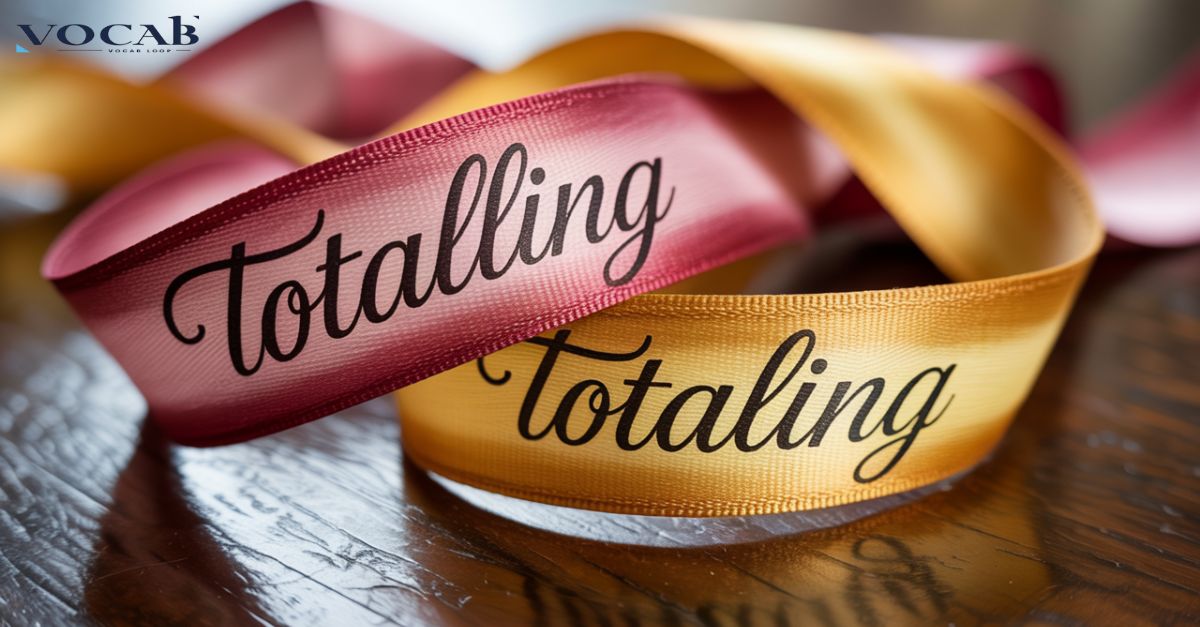When writing in English, spelling can change depending on where you are. A common example is the word totalling or totaling. They both come from the same base word—total as a verb—but how they are spelled changes depending on the country. This blog post explains everything you need to know about these words. You’ll learn the difference, the spelling convention, how to use them, and even how to remember the correct form based on where you’re writing.
Understanding this difference helps avoid spellcheck errors, follows the right grammar style guide, and keeps your writing clear and professional. Let’s look at the full picture behind totalling or totaling, including their verb forms, usage, and history.
What Does Mean of totalling
The word totalling is a present participle of total, used mostly in British English. It describes the act of adding numbers together to find the final sum. For example, someone might say, “He was totalling the day’s receipts.” This is a continuous action verb, showing something in progress.
In this form, it can also be used as a noun or adjective, like “The totalling of data was done by hand,” or “a totalling machine.” Its double L spelling follows the usual British spelling rules where words ending in a vowel plus ‘l’ double the ‘l’ when adding ‘-ing’ or ‘-ed’.
What Does Mean of totaling
The word totaling means the same thing, but it is the version used in American English. It’s also the present participle of total, used to show an ongoing action like “I am totaling the receipts.” The spelling convention in the U.S. prefers a single ‘l’, especially in words where the stress isn’t on the last syllable.
This is part of the larger American English spelling reform movement, where many words like travelling/traveling or modelling/modeling lost the second ‘l’. Though the totaling meaning is the same, it fits the simplified American spelling that aims for easier reading and writing.
The short answer: both are correct, but it depends on where you are and what style guide you follow.
Quick Summary between totalling or totaling
While both versions mean the same thing, the difference lies in where they are used. British English sticks to totalling with two ‘l’s. American English uses totaling with just one. The meaning, grammar role, and usage are completely the same. They both show an action in progress and are formed from total as a verb.
This difference is a common type of British vs American spelling variation. Here’s a quick overview:
| Word | Spelling | Region | Meaning | Use in Sentence |
| Totalling | Double L | UK | Adding numbers | She is totalling the costs |
| Totaling | Single L | US | Adding numbers | He is totaling expenses |
Pronunciation of totalling or totaling
Even though these words look different, they sound the same. The pronunciation is /ˈtəʊtəlɪŋ/ in British English and /ˈtoʊtəlɪŋ/ in American English. The difference in sound is mostly in the accent, not in the structure of the word.
Because they are spoken the same, this adds to spelling confusion examples. When writing, it’s important to pick the right spelling based on your English spelling standard. Many people confuse the two because you can’t hear the difference when speaking.
Spelling and Visual Cues of totalling or totaling
There’s a simple pattern that explains this. British English often doubles the ‘l’ in words when adding suffixes like -ing. This applies to totalling. In contrast, American English drops the second ‘l’ and simplifies the form to totaling. This is part of a long tradition of keeping spelling shorter and more regular.
To remember this, look at the ending. If you see double L, it’s likely from UK English vs US English differences. If it’s single L, you’re dealing with simplified American spelling. This trick works for many other words like travelling/traveling, funnelling/funneling, and modelling/modeling.
Key Difference between totalling or totaling
The regional spelling difference is the only real variation. The verb conjugation in English is the same: both are the continuous tense form of the verb “to total.” Both are used when calculating totals, whether in spreadsheets, financial reports, or simple math.
It’s important to choose the correct one based on your audience. If you’re writing for an American business, use totaling. If your audience is British or international (excluding the U.S.), go with totalling. This small detail helps maintain consistency and credibility in your writing.
Comparison Table between totalling or totaling
Here’s a full comparison between the two versions:
| Feature | Totalling | Totaling |
| Spelling Style | Double L spelling | Single L spelling |
| Region | British English | American English |
| Part of Speech | Present participle of total | Present participle of total |
| Usage Type | Formal and Informal | Formal and Informal |
| Accent | /ˈtəʊtəlɪŋ/ | /ˈtoʊtəlɪŋ/ |
| Spelling convention | British spelling rules | American English spelling reform |
| Used In | UK, Australia, Canada | USA |
Common Mistakes in totalling or totaling
One of the biggest mistakes is mixing the two styles in one document. Using totalling in a U.S. report may trigger spellcheck errors, while totaling in a UK essay might be marked wrong. Another issue is auto-correct tools that assume one form is always correct.
Writers often forget to match the spelling with their grammar style guide or region, leading to confusion. These kinds of mistakes are common in emails, academic papers, and even published books.
Formal vs Informal Usage of totalling or totaling

Both forms are used in formal and informal writing, but always stay consistent with your region. In formal documents like financial reports, choose the spelling based on the country of publication. A U.S. company will expect totaling, while a British institution uses totalling.
In casual texts, such as blogs or emails, either can be used—but again, consistency is key. If your audience is global, consider sticking to one form throughout to avoid confusion.
Usage in Different English Varieties totalling or totaling
Totalling is standard in British English, Australian English, and Canadian English. These countries follow the same British spelling rules that apply to other double-L words. Totaling, however, is used in the United States and is the preferred form in most American writing tools.
Many writers learning English get confused by these spelling variations in English. They are subtle but important for clear and correct writing. Using the wrong form can distract readers or reduce trust in professional contexts.
Simple Trick to Remember the Difference of totalling or totaling
Here’s an easy spelling memory trick. Think of “totalling” with two L’s like “shilling,” which was used in the UK. Both words have double L spelling and are linked to British use. For “totaling,” think of “traveling”, which is how Americans spell it—both drop the second ‘l’.
This trick can help you quickly recall which form is correct when writing for different regions or audiences.
Examples in Sentences of totalling or totaling
Totalling:
- She spent her afternoon totalling the receipts from the market.
- The invoices were totalling nearly ten thousand pounds.
- After hours of data entry, he finished totalling the votes.
- The machine is totalling all transactions in real time.
- The spreadsheet was used for totalling expenses during the trip.
- She checked the ledger before totalling the week’s sales.
- Their combined efforts led to totalling every item twice.
- The accountant was totalling numbers late into the night.
- Totalling the prices helped them stick to their budget.
- The company is totalling yearly earnings before tax season.
Totaling:
- I’m totaling our monthly bills before payday.
- He started totaling the costs for the new project.
- The bookkeeper is totaling receipts for the audit.
- They are totaling damage reports from the storm.
- The system is totaling all credit card transactions.
- She began totaling her hours for payroll.
- We’re totaling every item on the inventory list.
- He spent his evening totaling vacation expenses.
- Totaling everything now helps avoid surprises later.
- The software is totaling expenses as you enter them.
Synonyms of totalling or totaling
Totalling:
- Summing
- Adding up
- Tallying
- Counting
- Calculating
- Tabulating
- Computing
- Estimating
- Aggregating
- Summarizing
Totaling:
- Crunching numbers
- Adding together
- Making totals
- Running the numbers
- Doing the math
- Calculating amounts
- Listing totals
- Checking sums
- Tabulating data
- Compiling totals
Origins of totalling or totaling
Totalling:
The word totalling evolved from the Latin “totalis,” meaning “entire” or “whole.” Over time, it entered Middle English, then modern English. As it spread through the UK and Commonwealth, it took on British spelling rules, including the practice of doubling final consonants.
This made totalling the normal form in England and influenced many spelling variations in English across other English-speaking regions.
Totaling:
The U.S. chose a simpler form by removing extra letters. During the 19th and early 20th century, there was a strong push for American English spelling reform. This created new patterns that dropped doubled letters when not needed.
Totaling is part of this effort to streamline and make spelling more logical and consistent in the United States.
Fun Fact about totalling or totaling
In American slang, to “total” a car means it’s damaged beyond repair—something insurance companies use! That’s a very different usage from totalling or totaling numbers. But it shows how total as a verb can change meaning based on context.
Another interesting thing: word processors often autocorrect totalling to totaling if your settings are set to U.S. English. So always check your grammar style guide settings.
FAQ’s
Which is correct, totaling or totalling?
Both are correct—totalling is used in British English, and totaling is used in American English.
How do you spell totalled in the UK?
In the UK, it’s spelled totalled with two L’s, following British spelling rules.
How do you use totaling?
Use totaling to describe the action of adding up numbers, like “She is totaling the bill.”
Why is British spelling different?
British spelling keeps older forms of English, while American English changed some words to make them shorter and simpler.
Is it totalled or totaled in Canada?
Canada mostly uses totalled, like British English, but American spellings also appear often.
Conclusion
Whether you’re using totalling or totaling, the meaning stays the same: it’s the act of adding numbers to find a final amount. The only real difference is the spelling convention, driven by region. Stick with totaling in the U.S. and totalling in British-style writing.
Understanding this regional spelling difference helps improve your writing, follow the right English spelling standard, and avoid spelling confusion examples. Keep your spelling consistent, and your totals correct.

Alex Hormozi is a seasoned blogger at Vocab Loop, known for his deep insights into language, vocabulary, and grammar. With years of experience in writing, Alex shares practical tips and effective strategies to help readers improve their linguistic skills and enhance their writing abilities.

